Book Review: “Thinking in Bets”
Book: Thinking in Bets by Annie Duke
Reviewer: Bobby Powers
My Thoughts: 8 of 10
Thinking in Bets is an exposé of our illogical thinking patterns, told by a poker pro schooled in graduate-level psychology. In this book, poker champion Annie Duke shares her experience studying human behavior at high-stakes poker tables. Duke's work is a timely explanation of why we succumb to fake news, "Monday morning quarterbacking," and "resulting" (explained below). I learned a lot from this book, and I've begun to draw upon its insights in my work. I think you'll find this book to be a practical guide for improving decision-making in any area of your life.
Selected Quotes and Ideas from the Book
Duke’s Background
- Duke graduated from Columbia University with degrees in English and psychology, then went on to earn her master’s in psychology at the University of Pennsylvania. While completing her doctoral course work in cognitive psychology, she became extremely ill and took a leave of absence. During that time, she picked up poker.
- “When I retired from playing in 2012, I had won a World Series of Poker gold bracelet, the WSOP Tournament of Champions, and the NBC National Heads-Up championship, and earned more than $4 million in poker tournaments.”
- “I realized pretty quickly that I hadn’t really left academics so much as moved to a new kind of lab for studying how people learn and make decisions. A hand of poker takes about two minutes. Over the course of that hand, I could be involved in up to twenty decisions. And each hand ends with a concrete result: I win money or I lose money. The result of each hand provides immediate feedback on how your decisions are faring. But it’s a tricky kind of feedback because winning and losing are only loose signals of decision quality.”
- “Over time, those world-class poker players taught me to understand what a bet really is: a decision about an uncertain future. The implications of treating decisions as bets made it possible for me to find learning opportunities in uncertain environments.”
- “Thinking in bets starts with recognizing that there are exactly two things that determine how our lives turn out: the quality of our decisions and luck. Learning to recognize the difference between the two is what thinking in bets is all about.”
Resulting
- Duke begins the book by sharing a recent example from the NFL. In Super Bowl XLIX, Seattle Seahawks coach Pete Carroll made the decision to pass on the 1-yard line during the final seconds of the game. The pass was intercepted, causing the Seahawks to lose. Carroll's decision was forever criticized by all of the "Monday morning quarterbacks" who thought they knew better than Coach Carroll.
- “Pete Carroll was a victim of our tendency to equate the quality of a decision with the quality of its outcome. Poker players have a word for this: ‘resulting.’”
- “Resulting is a routine thinking pattern that bedevils all of us. Drawing an overly tight relationship between results and decision quality affects our decisions every day, potentially with far-reaching, catastrophic consequences.”
- “What makes a decision great is not that it has a great outcome. A great decision is the result of a good process, and that process must include an attempt to accurately represent our own state of knowledge."
- "We will pound a lot of square pegs into round holes to maintain the illusion of a tight relationship between our outcomes and our decisions.”
Life Is Poker, Not Chess
- “Chess, for all its strategic complexity, isn’t a great model for decision-making in life, where most of our decisions involve hidden information and a much greater influence of luck...Poker, in contrast, is a game of incomplete information. It is a game of decision-making under conditions of uncertainty over time...Valuable information remains hidden. There is also an element of luck in any outcome.”
- “What good poker players and good decision-makers have in common is their comfort with the world being an uncertain and unpredictable place...They embrace that uncertainty and, instead of focusing on being sure, they try to figure out how unsure they are, making their best guess at the chances that different outcomes will occur.”
- “The secret is to make peace with walking around in a world where we recognize that we are not sure and that’s okay.”
- “Decisions are bets on the future, and they aren’t ‘right’ or ‘wrong’ based on whether they turn out well on any particular iteration. An unwanted result doesn’t make our decision wrong if we thought about the alternatives and probabilities in advance and allocated our resources accordingly.”
- “When we move away from a world where there are only two opposing and discrete boxes that decisions can be put in--right or wrong--we start living in the continuum between the extremes. Making better decisions stops being about wrong or right but about calibrating among all the shades of grey.”
- “Redefining wrong allows us to let go of all the anguish that goes from getting a bad result. But it also means we must redefine ‘right.’ If we aren’t wrong just because things didn’t work out, then we aren’t right just because things turned out well.”
Motivated Reasoning
- “Truthseeking, the desire to know the truth regardless of whether the truth aligns with the beliefs we currently hold, is not naturally supported by the way we process information. We might think of ourselves as open-minded and capable of updating our beliefs based on new information, but the research conclusively shows otherwise. Instead of altering our beliefs to fit new information, we do the opposite, altering our interpretation of that information to fit our beliefs.”
- “Once a belief is lodged, it becomes difficult to dislodge. It takes on a life of its own, leading us to notice and seek out evidence confirming our belief, rarely challenge the validity of confirming evidence, and ignore or work hard to actively discredit information contradicting the belief. This irrational, circular information-processing pattern is called motivated reasoning.”
- “The Internet is a playground for motivated reasoning. It provides the promise of access to a greater diversity of information sources and opinions than we’ve ever had available, yet we gravitate toward sources that confirm our beliefs, that agree with us...Making matters worse, many social media sites tailor our Internet experience to show us more of what we already like.”
- “Even when directly confronted with facts that disconfirm our beliefs, we don’t let facts get in the way...If we think of beliefs as only 100% right or 100% wrong, when confronting new information that might contradict our belief, we have only two options: (a) make the massive shift in our opinion of ourselves from 100% right to 100% wrong, or (b) ignore or discredit the new information. It feels bad to be wrong, so we choose (b). Information that disagrees with us is an assault on our self-narrative. We’ll work hard to swat that threat away. On the flip side, when additional information agrees with us, we effortlessly embrace it.”
Fielding the Unfolding Future
- “Just as we are almost never 100% wrong or right, outcomes are almost never 100% due to luck or skill.”
- “The way we field outcomes (decide what is luck and what is skill) is predictably patterned: we take credit for the good stuff and blame the bad stuff on luck so it won’t be our fault. The result is that we don’t learn from experience well.”
- “100% of our bad outcomes aren’t because we got unlucky and 100% of our good outcomes aren’t because we are so awesome. Yet that is how we process the future as it unfolds.”
Improving Communication
- “When we have a negative opinion about the person delivering the message, we close our minds to what they are saying and miss a lot of learning opportunities because of it. Likewise, when we have a positive opinion of the messenger, we tend to accept the message without much vetting. Both are bad...The accuracy of the statement should be evaluated independent of its source.”
- How to communicate in a truthseeking way:
- “First, express uncertainty. Uncertainty not only improves truthseeking within groups but also invites everyone around us to share helpful information and dissenting opinions.”
- “Second, lead with assent. For example, listen for the things you agree with, state those and be specific, and then follow with ‘and’ instead of ‘but.’ If there is one thing we have learned thus far it is that we like having our ideas affirmed. If we want to engage someone with whom we have some disagreement (inside or outside our group), they will be more open and less defensive if we start with those areas of agreement, which there surely will be.”
- “When we lead with assent, our listeners will be more open to any dissent that might follow. In addition, when the new information is presented as supplementing rather than negating what has come before, our listeners will be much more open to what we have to say.”
Mental Time Travel
- “Business journalist and author Suzy Welch developed a popular tool known as 10-10-10 that has the effect of bringing future-us into more of our in-the-moment decisions. ‘Every 10-10-10 process starts with a question...[W]hat are the consequences of each of my options in ten minutes? In ten months? In ten years?’ This set of questions triggers mental time travel.”
- “When we identify the goal and work backward from there to ‘remember’ how we got there, the research shows that we do better.”
- “Forgetting about an unrealized future can be dangerous to good decision-making.”
- “[W]e tend to assume that, once something happens, it was bound to happen. If we don’t try to hold all the potential futures in mind before one of them happens, it becomes almost impossible to realistically evaluate decisions or probabilities after.”
- “Once something occurs, we no longer think of it as probabilistic--or as ever having been probabilisitic. This is how we get into the frame of mind where we say, ‘I should have known’ or ‘I told you so.’ This is where unproductive regret comes from.”
Think you’d like this book?
Other books you may enjoy:
Factfulness by Hans Rosling with Ola Rosling and Anna Rosling Rönnlund
The Biggest Bluff by Maria Konnikova
Predictably Irrational by Dan Ariely
Other notable books by the author:
How I Raised, Folded, Bluffed, Flirted, Cursed, and Won Millions by Annie Duke with D. Diamond
Decide to Play Great Poker by Annie Duke and John Vorhaus
Heads Up Tournament Poker by Vanessa Rousso and Annie Duke
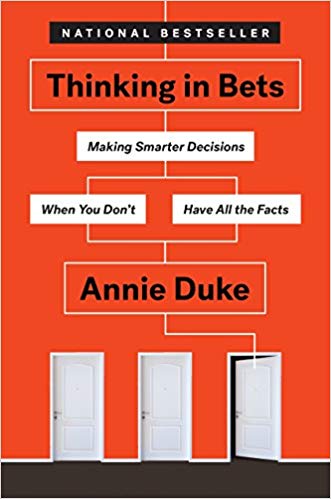
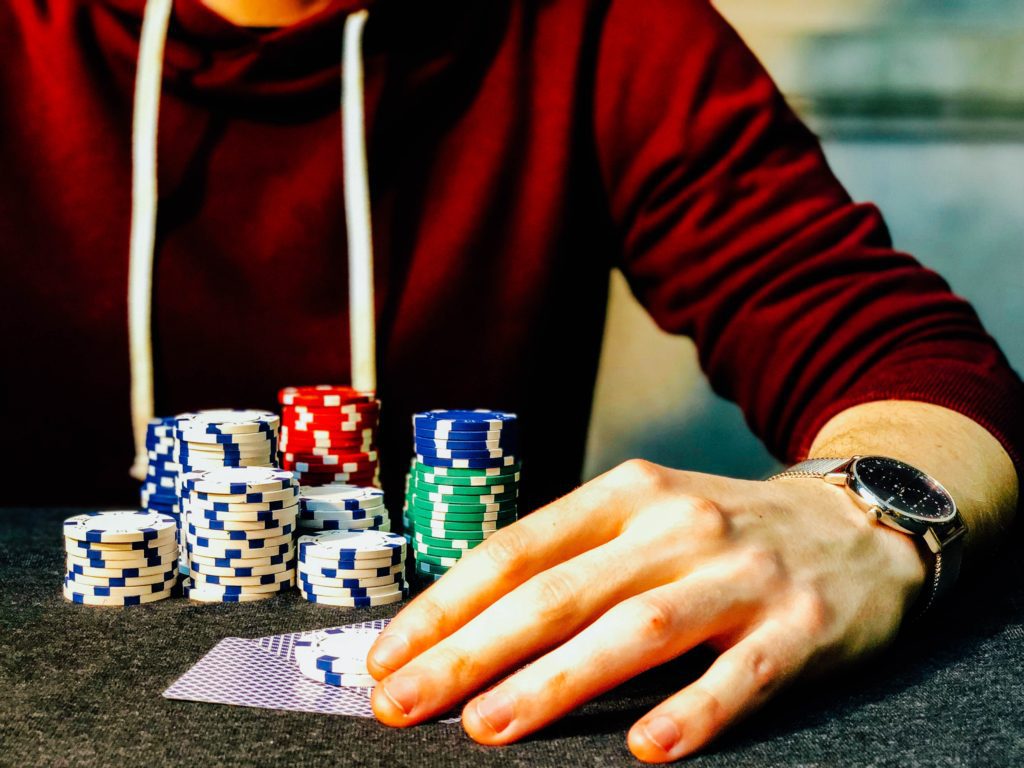
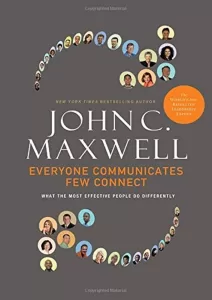
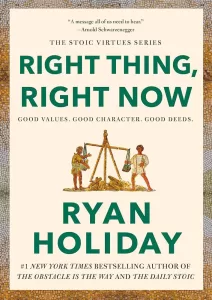
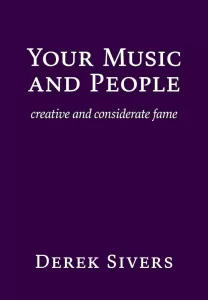
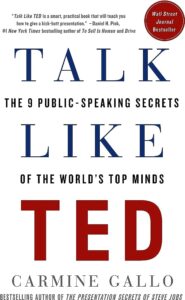
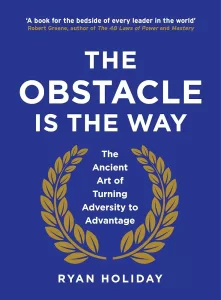
Thank you for sharing your personal experience on this topic “Book Review: “Thinking in Bets”. It adds a relatable touch to the article and helps readers connect on a deeper level. I look forward to reading more from you.